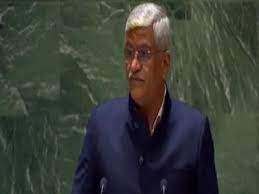UNITED NATIONS: India has committed investments of more than 240 billion dollars in the water sector and is implementing the largest dam rehabilitation programme in the world as well as efforts to restore groundwater level, Minister of Jal Shakti Gajendra Singh Shekhawat told the UN.
Shekhawat highlighted the ambitious programmes and efforts being undertaken in India towards ensuring water security and achieving Sustainable Development Goal (SDG) 6 of clean water and sanitation for all as he addressed the UN Water Conference 2023 on Thursday.
“We have committed investments of more than 240 billion dollars in the water sector through government resources, in partnership with private innovators, start-ups, and water-user associations. India is implementing two flagship missions to ensure universal access to sanitation and drinking water,” Shekhawat said, delivering the national statement in the UN General Assembly.
He said India is implementing the largest dam rehabilitation programme in the world, to build climate resilience critical water storage infrastructure. Further, due to the country’s unique geography, India is among the largest users of groundwater in the world.
“However, today we are making efforts to restore groundwater level and create mindful communities by combining demand and supply side interventions through village Water Security Plans, inculcating behavioural changes on water usage and conservation at the grassroots level, financing these plans through incentives and convergence of existing programmes,” he said, adding that this had led to creating greater community ownership in the equitable management of water at a local level.
Shekhawat told the conference that India’s ambitious National Mission for Clean Ganga or Namami Gange had been recently recognised by the UN Convention of Biodiversity conference COP15 held at Montreal as one of the top 10 World Restoration Flagships to revive the natural world.
“This mission has created a paradigm shift in river rejuvenation, pollution abatement, conservation of ecosystems and holistic approach to river basin management,” he said.


